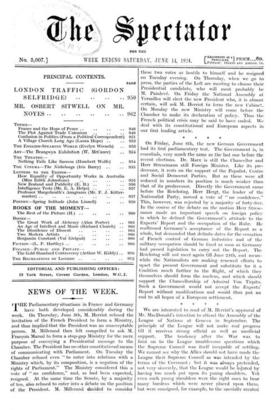On Friday, June 6th, the new German Government had its
first parliamentary test. The Government is, in essentials, very mueh the same as the last one before the 954 recent elections. Dr. Marx is still the Chancellor and Herr Stresemann still Foreign Minister. Like its pre- decessor, it rests on the support of the Populist, Centre and Social Democrat Parties. But as these were all reduced in numbers its position is much weaker than that of its predecessor. Directly the Government came before the Reichstag, Herr Hergt, the leader of the Nationalist Party, moved a vote of "no confidence." This, however, was rejected by a majority of forty-five. In the course of the debate on the motion Herr Strese- mann made an important speech on foreign policy in which he defined the Government's attitude to the Experts' Report and the occupation of the Ruhr. He reaffirmed Germany's acceptance of the Report as a whole,. but demanded that definite dates for the cessation of French control of German industries and of the military occupation should be fixed as soon as Germany had passed legislation to carry out the Report. The Reichstag will not meet again till June 24th, and mean- while the Nationalists are making renewed efforts to upset the present Government and substitute for it a Coalition much further to the Right, of which they themselves should form the nucleus, and which should support the Chancellorship of Admiral Von Tirpitz. Such a Government would not accept the Experts' Report without modifications and would thus put an end to all hopes of a European settlement.










































